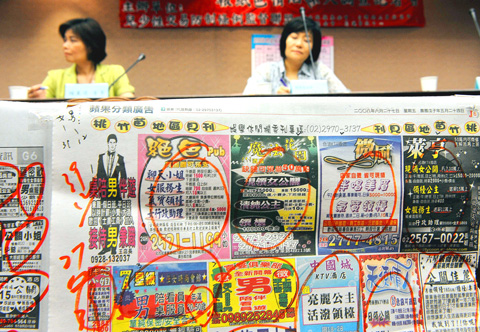As students look for summer jobs, women’s and children’s welfare groups reminded young job-seekers yesterday to be aware of the large number of illegal sex industry ads in newspapers.
“Many students look for part-time jobs during the summer vacation, but with the large number of sex trade classifieds, those who are not strong-willed enough or really need cash may be tempted into the industry without being aware of the dangers,” Cynthia Kao (高小晴), executive director of the Women’s Rescue Foundation, told a news conference at the Legislative Yuan.
The groups said that on June 27 there were 1,933 sex-industry employment ads in the four major Chinese-language newspapers nationwide.

PHOTO: CNA
These ads share some common traits, Garden of Hope Foundation executive director Chi Hui-jung (紀惠容) said, urging parents to pay more attention to the ads their children are looking at or what types of jobs they’re looking for.
“These ads are usually found in the ‘entertainment jobs’ section — try to avoid that section when looking for a job,” she said. “Also pay attention to the work location — sex-related ads often don’t give a specific location, they just provide a telephone number.”
A recording of a telephone conversation between a sex industry employer and girl pretending to look for a job was played for reporters. The girl was a volunteer with one of the groups and called a number in an ad that said “hiring part-time female.”
When the girl asked what the “part-time female” job was, the man who answered the phone said: “It’s, you know, the special industry kind of job.”
The man asked if the girl would like to work in enjo-kosai, a Japanese term refering to sexual services provided by teenage girls for money or other valuables.
The man kept telling the girl that she could be making between NT$10,000 to NT$20,000 a day, and that he could lend her NT$20,000 once she agreed to start working for him.
“When you see a job with high pay, that requires no experience and the employer says that they can lend you some money, you should be careful,” Chi said.
Kao said local governments should better enforce the law and newspapers should review their ads more carefully. She also urged people to report such ads to the police and said the police should take a more active approach in locating such illegal employers.
Council of Labor Affairs official Shen Wen-li (沈文麗) urged students looking for summer jobs to go through the council’s 300 plus public employment service centers nationwide. Shen said the council would work harder to crackdown on illegal employers.

Chinese Nationalist Party (KMT) Chairman Eric Chu (朱立倫), spokeswoman Yang Chih-yu (楊智伃) and Legislator Hsieh Lung-chieh (謝龍介) would be summoned by police for questioning for leading an illegal assembly on Thursday evening last week, Minister of the Interior Liu Shyh-fang (劉世芳) said today. The three KMT officials led an assembly outside the Taipei City Prosecutors’ Office, a restricted area where public assembly is not allowed, protesting the questioning of several KMT staff and searches of KMT headquarters and offices in a recall petition forgery case. Chu, Yang and Hsieh are all suspected of contravening the Assembly and Parade Act (集會遊行法) by holding

PRAISE: Japanese visitor Takashi Kubota said the Taiwanese temple architecture images showcased in the AI Art Gallery were the most impressive displays he saw Taiwan does not have an official pavilion at the World Expo in Osaka, Japan, because of its diplomatic predicament, but the government-backed Tech World pavilion is drawing interest with its unique recreations of works by Taiwanese artists. The pavilion features an artificial intelligence (AI)-based art gallery showcasing works of famous Taiwanese artists from the Japanese colonial period using innovative technologies. Among its main simulated displays are Eastern gouache paintings by Chen Chin (陳進), Lin Yu-shan (林玉山) and Kuo Hsueh-hu (郭雪湖), who were the three young Taiwanese painters selected for the East Asian Painting exhibition in 1927. Gouache is a water-based

Taiwan would welcome the return of Honduras as a diplomatic ally if its next president decides to make such a move, Minister of Foreign Affairs Lin Chia-lung (林佳龍) said yesterday. “Of course, we would welcome Honduras if they want to restore diplomatic ties with Taiwan after their elections,” Lin said at a meeting of the legislature’s Foreign Affairs and National Defense Committee, when asked to comment on statements made by two of the three Honduran presidential candidates during the presidential campaign in the Central American country. Taiwan is paying close attention to the region as a whole in the wake of a

OFF-TARGET: More than 30,000 participants were expected to take part in the Games next month, but only 6,550 foreign and 19,400 Taiwanese athletes have registered Taipei city councilors yesterday blasted the organizers of next month’s World Masters Games over sudden timetable and venue changes, which they said have caused thousands of participants to back out of the international sporting event, among other organizational issues. They also cited visa delays and political interference by China as reasons many foreign athletes are requesting refunds for the event, to be held from May 17 to 30. Jointly organized by the Taipei and New Taipei City governments, the games have been rocked by numerous controversies since preparations began in 2020. Taipei City Councilor Lin Yen-feng (林延鳳) said yesterday that new measures by